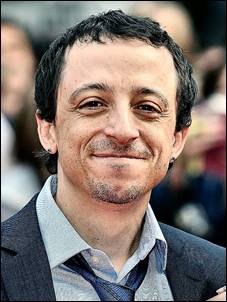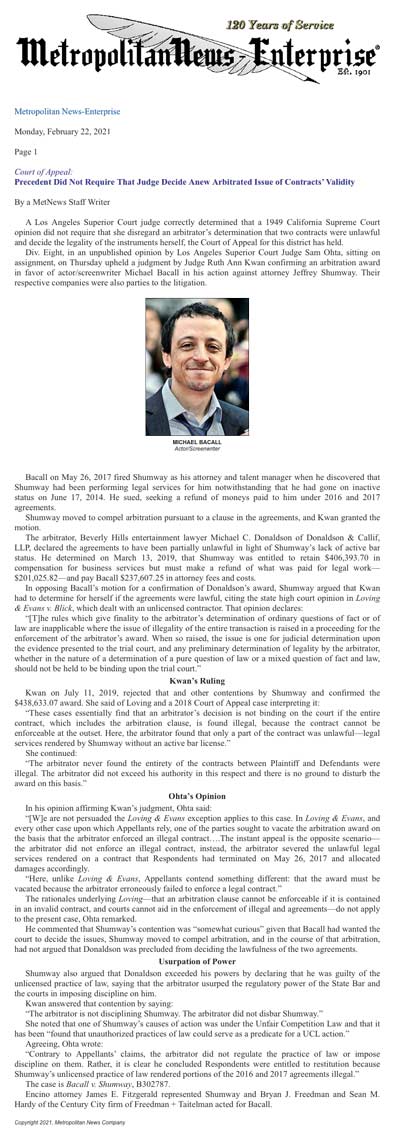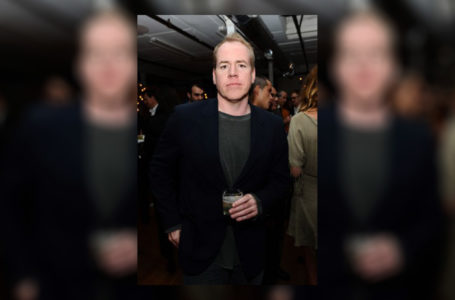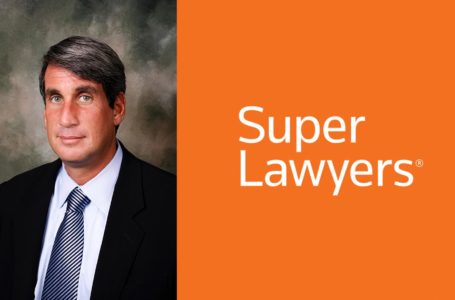Court of Appeal
A Los Angeles Superior Court judge correctly determined that a 1949 California Supreme Court opinion did not require that she disregard an arbitrator’s determination that two contracts were unlawful and decide the legality of the instruments herself, the Court of Appeal for this district has held.
Div. Eight, in an unpublished opinion by Los Angeles Superior Court Judge Sam Ohta, sitting on assignment, on Thursday upheld a judgment by Judge Ruth Ann Kwan confirming an arbitration award in favor of actor/screenwriter Michael Bacall in his action against attorney Jeffrey Shumway. Their respective companies were also parties to the litigation.

Bacall on May 26, 2017 fired Shumway as his attorney and talent manager when he discovered that Shumway had been performing legal services for him notwithstanding that he had gone on inactive status on June 17, 2014. He sued, seeking a refund of moneys paid to him under 2016 and 2017 agreements.
Shumway moved to compel arbitration pursuant to a clause in the agreements, and Kwan granted the motion.
The arbitrator, Beverly Hills entertainment lawyer Michael C. Donaldson of Donaldson & Callif, LLP, declared the agreements to have been partially unlawful in light of Shumway’s lack of active bar status. He determined on March 13, 2019, that Shumway was entitled to retain $406,393.70 in compensation for business services but must make a refund of what was paid for legal work—$201,025.82—and pay Bacall $237,607.25 in attorney fees and costs.
In opposing Bacall’s motion for a confirmation of Donaldson’s award, Shumway argued that Kwan had to determine for herself if the agreements were lawful, citing the state high court opinion in Loving & Evans v. Blick, which dealt with an unlicensed contractor. That opinion declares:
“[T]he rules which give finality to the arbitrator’s determination of ordinary questions of fact or of law are inapplicable where the issue of illegality of the entire transaction is raised in a proceeding for the enforcement of the arbitrator’s award. When so raised, the issue is one for judicial determination upon the evidence presented to the trial court, and any preliminary determination of legality by the arbitrator, whether in the nature of a determination of a pure question of law or a mixed question of fact and law, should not be held to be binding upon the trial court.”
Kwan’s Ruling
Kwan on July 11, 2019, rejected that and other contentions by Shumway and confirmed the $438,633.07 award. She said of Loving and a 2018 Court of Appeal case interpreting it:
“These cases essentially find that an arbitrator’s decision is not binding on the court if the entire contract, which includes the arbitration clause, is found illegal, because the contract cannot be enforceable at the outset. Here, the arbitrator found that only a part of the contract was unlawful—legal services rendered by Shumway without an active bar license.”
She continued:
“The arbitrator never found the entirety of the contracts between Plaintiff and Defendants were illegal. The arbitrator did not exceed his authority in this respect and there is no ground to disturb the award on this basis.”
Ohta’s Opinion
In his opinion affirming Kwan’s judgment, Ohta said:
“[W]e are not persuaded the Loving & Evans exception applies to this case. In Loving & Evans, and every other case upon which Appellants rely, one of the parties sought to vacate the arbitration award on the basis that the arbitrator enforced an illegal contract….The instant appeal is the opposite scenario—the arbitrator did not enforce an illegal contract, instead, the arbitrator severed the unlawful legal services rendered on a contract that Respondents had terminated on May 26, 2017 and allocated damages accordingly.
“Here, unlike Loving & Evans, Appellants contend something different: that the award must be vacated because the arbitrator erroneously failed to enforce a legal contract.”
The rationales underlying Loving—that an arbitration clause cannot be enforceable if it is contained in an invalid contract, and courts cannot aid in the enforcement of illegal and agreements—do not apply to the present case, Ohta remarked.
He commented that Shumway’s contention was “somewhat curious” given that Bacall had wanted the court to decide the issues, Shumway moved to compel arbitration, and in the course of that arbitration, had not argued that Donaldson was precluded from deciding the lawfulness of the two agreements.
Usurpation of Power
Shumway also argued that Donaldson exceeded his powers by declaring that he was guilty of the unlicensed practice of law, saying that the arbitrator usurped the regulatory power of the State Bar and the courts in imposing discipline on him.
Kwan answered that contention by saying:
“The arbitrator is not disciplining Shumway. The arbitrator did not disbar Shumway.”
She noted that one of Shumway’s causes of action was under the Unfair Competition Law and that it has been “found that unauthorized practices of law could serve as a predicate for a UCL action.”
Agreeing, Ohta wrote:
“Contrary to Appellants’ claims, the arbitrator did not regulate the practice of law or impose discipline on them. Rather, it is clear he concluded Respondents were entitled to restitution because Shumway’s unlicensed practice of law rendered portions of the 2016 and 2017 agreements illegal.”
The case is Bacall v. Shumway, B302787.
Encino attorney James E. Fitzgerald represented Shumway and Bryan J. Freedman and Sean M. Hardy of the Century City firm of Freedman + Taitelman acted for Bacall.





